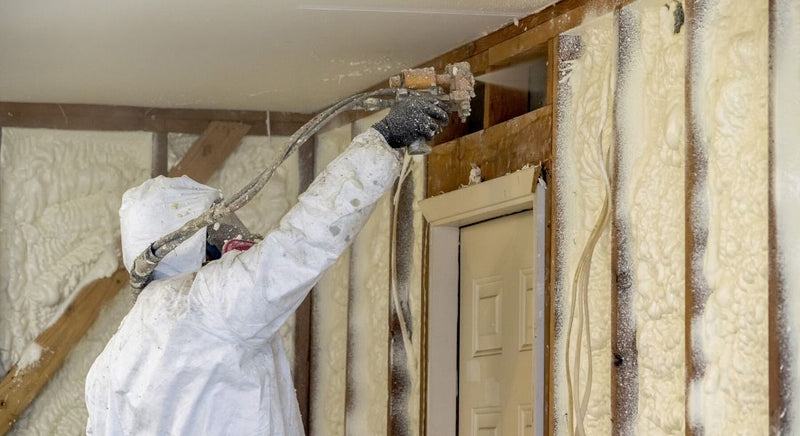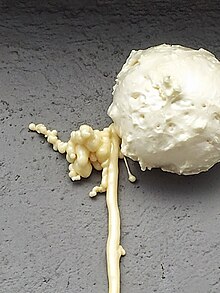The Process of Using Spray Foam: What You Need to Know
The Process of Using Spray Foam: What You Need to Know
Blog Article
Spray Foam: The Ultimate Solution for Air Sealing and Insulation
Spray foam insulation has actually emerged as a leading service for reliable air securing and thermal insulation, providing an unique combination of buildings that set it apart from conventional techniques. Comprehending the complete range of its advantages, installation procedures, and comparisons with various other insulation types is essential for making notified choices.
What Is Spray Foam?
Spray foam is a flexible insulation product that integrates the concepts of air securing and thermal resistance to improve energy effectiveness in structures. Composed mostly of polyurethane or various other comparable substances, spray foam is used as a fluid that increases upon call with surface areas, creating a solid, continuous layer of insulation. This one-of-a-kind building allows it to fill spaces, splits, and voids that conventional insulation materials may ignore, giving an exceptional air seal.
There are 2 primary kinds of spray foam: open-cell and closed-cell. Open-cell spray foam is lighter and more adaptable, offering exceptional sound absorption and a lower R-value per inch - Spray Foam. On the other hand, closed-cell spray foam is denser, giving a greater R-value, dampness resistance, and included structural stability to building elements
The application process commonly includes specific equipment, making sure a smooth application that sticks to various substrates, consisting of concrete, metal, and wood. This flexibility makes spray foam appropriate for both brand-new constructions and retrofitting existing frameworks. Its capacity to produce an impermeable obstacle considerably adds to reducing power intake and boosting interior air high quality, therefore making it a recommended option amongst homeowners and builders alike.
Benefits of Spray Foam Insulation
One of one of the most substantial advantages of spray foam insulation is its exceptional capacity to produce a continuous air obstacle, which efficiently lessens power loss. Unlike standard insulation materials, spray foam broadens to load spaces and splits, guaranteeing that air leak is dramatically decreased. This characteristic not just improves power efficiency but likewise causes decrease utility costs in time.
Additionally, spray foam insulation gives premium thermal resistance, adding to a more stable interior setting. Its high R-value per inch enables reliable insulation in constrained rooms, making it perfect for attics, walls, and crawl areas. The moisture-resistant buildings of spray foam aid stop mold and mildew growth, promoting much healthier living conditions.
Another vital advantage of spray foam insulation is its sound-dampening high qualities (Spray Foam). It efficiently decreases sound transmission in between spaces, developing a quieter and extra comfortable home environment. The sturdiness of spray foam likewise sticks out, as it does not droop or work out in time, keeping its efficiency throughout its life expectancy
How Spray Foam Works
Recognizing exactly how spray foam insulation works is important for appreciating its performance in air securing and thermal resistance. Spray foam insulation contains two primary elements: isocyanate and polyol resin. When these parts are mixed, they go through a chain reaction that creates the product to expand rapidly, producing a thick foam that fills fractures, dental caries, and gaps.
As the foam expands, it abides by surface areas, developing a closed seal that substantially reduces air seepage. This particular makes spray foam insulation very efficient at protecting against drafts and dampness infiltration, which can result in energy loss and damage gradually. Furthermore, the closed-cell variation of spray foam provides premium thermal resistance as a result of its stiff structure, efficiently decreasing warmth transfer.
The unique properties of spray foam enable it to adapt irregular surfaces, making sure comprehensive protection and a seamless barrier. As an outcome, spray foam insulation not only improves energy performance but additionally adds to boosted indoor air website here quality by decreasing the accumulation of contaminants and irritants. Eventually, recognizing the mechanics behind spray foam underscores its duty as a premium selection for insulation and air sealing in both domestic and industrial applications.
Setup Refine Summary

Before setup, the room must be adequately cleansed and prepped, making certain that surfaces are totally free from debris, dirt, and wetness. This step is vital because pollutants can jeopardize attachment and total performance. Once the area is prepared, the application involves mixing the 2 components of the spray foam, which broadens upon contact and fills voids successfully.
Educated experts should carry out the setup, using specific equipment to ensure consistent coverage and optimal density. Safety safety measures, including using protective equipment and making certain proper air flow, are vital during this procedure. After application, the foam commonly cures promptly, developing a strong barrier that boosts energy efficiency.
Comparing Spray Foam to Traditional Insulation
When reviewing insulation choices, spray foam insulation stands out in comparison to traditional materials such as fiberglass and cellulose. Unlike fiberglass and cellulose, which can allow air infiltration, spray foam increases upon application, loading holes and voids to create an impermeable seal.
Furthermore, spray foam provides a higher R-value per inch than typical insulation kinds, supplying even more reliable thermal resistance in a thinner profile. This characteristic is specifically beneficial in spaces with minimal cavity depth. Spray foam is click for more info immune to moisture and mold and mildew growth, which can be a significant issue with cellulose and fiberglass, particularly in damp atmospheres.
Nevertheless, spray foam insulation typically brings a greater in advance cost than its traditional equivalents. House owners should consider this initial financial investment against long-term energy financial savings and efficiency advantages. Ultimately, while both insulation kinds offer their purpose, spray foam becomes an extra advanced option for modern insulation needs, especially in terms of air sealing and thermal performance.

Final Thought
In summary, spray foam insulation represents an extremely effective service for attaining ideal air sealing and thermal resistance. Its distinct residential properties, consisting of wetness resistance and noise dampening, make it appropriate for various applications in both brand-new constructions and retrofitting tasks (Spray Foam). The preliminary costs may be greater contrasted to his response conventional insulation products, the long-lasting benefits, such as significant power financial savings and enhanced interior air quality, validate the investment and highlight its worth in modern building practices.
Spray foam insulation has actually emerged as a leading solution for effective air securing and thermal insulation, using an unique mix of residential or commercial properties that set it apart from typical methods.Spray foam is a versatile insulation material that integrates the principles of air securing and thermal resistance to improve energy effectiveness in buildings.When evaluating insulation alternatives, spray foam insulation stands out in contrast to standard materials such as fiberglass and cellulose. Inevitably, while both insulation kinds serve their purpose, spray foam arises as a much more advanced option for modern-day insulation requirements, particularly in terms of air sealing and thermal performance.
In recap, spray foam insulation stands for a highly reliable service for attaining optimal air sealing and thermal resistance.
Report this page